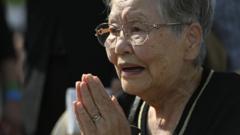At 08:15 on August 6, 1945, as Hiroshima faced one of the darkest moments in history, Lee Jung-soon, an 88-year-old survivor, was on her way to school. The atomic bomb descended, leaving 70,000 dead immediately and many more suffering in the aftermath. Among the nearly 140,000 Koreans in Hiroshima at the time, their experiences have often been overlooked.
Korean survivors like Lee and Shim Jin-tae, 83, carry haunting memories of that day and continue dealing with physical ailments stemming from radiation exposure. Despite their cries for acknowledgement and justice, many feel forgotten. Living in Hapcheon, dubbed "Korea's Hiroshima," these survivors recount how they were treated as outcasts upon returning home, facing stigma and discrimination that made it hard to recount their pain.
The struggles of these survivors funnel down to the next generations, who are also suffering from health issues. Without clear recognition from their own government or Japan, their plight remains largely ignored. Recently, Hiroshima officials made their first visit to Hapcheon, but an acknowledgment of the suffering endured by Koreans was absent, prompting advocates to reiterate that peace without apology is meaningless.
Survivors like Mr. Shim emphasize the importance of memory and acknowledgment. He states, “Memory matters more than compensation. Our bodies remember what we went through... If we forget, it'll happen again." The quest for recognition continues as each survivor carries a weight of history into an unexamined future.





















